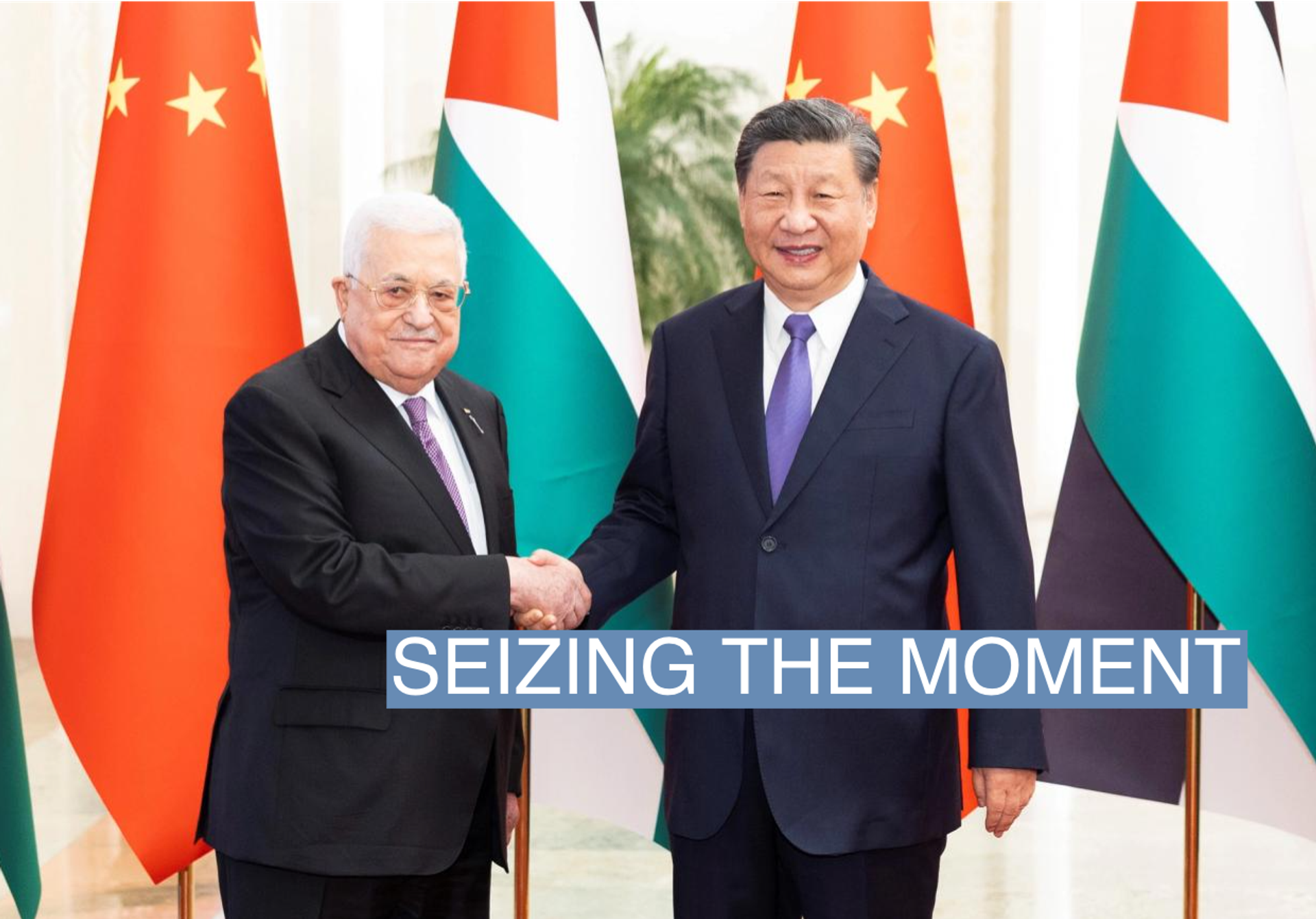The News
Israeli and American officials are alarmed that China hasn’t condemned Hamas for its terrorist attack this month, seeing in it an attempt by Beijing to use the Middle East’s violence to isolate the U.S. from its Arab and regional allies.
Chinese officials haven’t even used the word Hamas in their public statements since the militant Palestinian organization stormed into southern Israel on October 7 and slaughtered more than 1,400 Israelis. Instead, China has joined with Russia in calling for an immediate end to Israel’s military operations in the Gaza Strip and signaled its willingness to lead a new round of peace talks between Israel and the Palestinians. This negotiating process, historically anchored by the U.S., has essentially been dormant for a decade.
“China calls for an international peace conference with greater authority and impact as soon as possible to galvanize a more broad-based international consensus with the two-state solution serving as its basis and formulate a timetable and roadmap to that end,” China’s Foreign Ministry spokesman Wang Wenbin said last Friday. The diplomat said Beijing is working with Brazil, a leading member of the BRICS bloc of developing countries, which also includes Russia, India, China and South Africa, to pursue this diplomacy.
Israeli Prime Minister Benjamin Netanyahu’s government, which has forged strong economic ties with China, voiced alarm about Beijing’s silence on the attack. There was “no clear and unequivocal condemnation of the terrible massacre committed by the terrorist organization Hamas against innocent civilians and the abduction of dozens of them to Gaza,” Israeli Ambassador Rafi Harpaz told Beijing’s special envoy for the Middle East, Zhai Jun, last week, according to an Israeli Foreign Ministry statement.
Secretary of State Antony Blinken talked with his Chinese counterpart, Wang Yi, on Saturday and urged Beijing to discourage “other parties from entering the conflict.” China maintains close relations with Iran, which has threatened to widen the war on Israel if it launches an invasion of the Gaza Strip. Tehran is also Hamas’s main funder and arms supplier.
China’s Foreign Ministry on Sunday said that Wang told Iran’s Foreign Minister Hossein Amir-Abdollahian during a call “that countering violence with violence would only cause more damage and bring about more serious crises.”
In this article:
Jay’s view
Hamas’s attack and Israel’s response are exposing geopolitical rifts and fault lines in ways similar to Russia’s invasion last year of Ukraine. And China, aligned with the Kremlin, appears intent on exploiting them for major strategic gains.
The competition between the U.S. and China has been particularly furious in the Middle East in recent years, as Beijing has sought to chip away at America’s regional dominance. The Biden administration was startled last March when China brokered a normalization of relations between Iran and Saudi Arabia, the U.S.’s historic regional security and energy partner. China and Russia also backed an Arab League initiative last year to reintegrate Syria amongst its ranks, following a decade in which the U.S. and Europe tried to isolate, if not topple, President Bashar al-Assad for atrocities committed against his population.
The Biden administration, before the Hamas attack, had been fighting back feverishly against China’s gains by working to broker a new U.S. security agreement with Saudi Arabia that would include Riyadh normalizing relations with Israel. Such a deal would fundamentally alter the power balance in the Middle East by effectively ending Israel’s isolation in the Arab world. A security pact between the U.S., Israel and Saudi Arabia could also form a powerful bloc to push back against Iran, and its network of allied governments and militias, known as the Axis of Resistance, that includes Hamas and Lebanese Hezbollah.
Hamas’s assault on Israel has been widely praised by Tehran, U.S. and Israeli officials believe, because it seriously undermines the Biden administration’s hopes of finalizing this security compact with Saudi Arabia. Indeed, most Arab states have condemned Israel’s strikes on the Gaza Strip and refocused their calls on the resumption of talks to create an independent Palestinian state, in line with China’s recent statements. And a number of current and former Israeli officials see Beijing as essentially providing diplomatic cover for Iran and its proxies to continue their operations against the Jewish state.
“I think that it’s a sign that we need to act not just [on] the military level. We need to try to build a very strong front against the Iranians, Hezbollah, and, maybe…China [who’s] behind here in this war,” said retired Major General Amikam Norkin, former commander of the Israeli Air Force, on Monday.
But President Biden’s strong backing of Israel not only risks isolating Washington in the Middle East. It could also drain Washington’s focus on Ukraine, and U.S. military supplies, something that’s also in Beijing’s and Moscow’s interests.
Room for Disagreement
Some might argue that China’s stance on Gaza is as much about reflecting global opinion about the Palestinian-Israeli conflict as it is a strategic posture against the U.S. Beijing’s position places it in line with Mideast leaders and analysts who have criticized Washington’s lack of focus on the Palestinian issue, even before the October 7 attack. Both former President Trump, and now Biden, prioritized normalizing relations between Israel and Arab states, as part of the Abraham Accords, rather than trying to create an independent Palestinian one.
“Special Envoy Zhai Jun stressed during the phone calls that to end the cycle of conflict between Palestine and Israel, the key is to return to the two-state solution as the basis, restore peace talks, establish an independent State of Palestine, and realize the peaceful coexistence of Palestine and Israel,” Wang Wenbin said last Friday. “The international community needs to step up to that responsibility and create conditions for the resumption of the peace process.”

